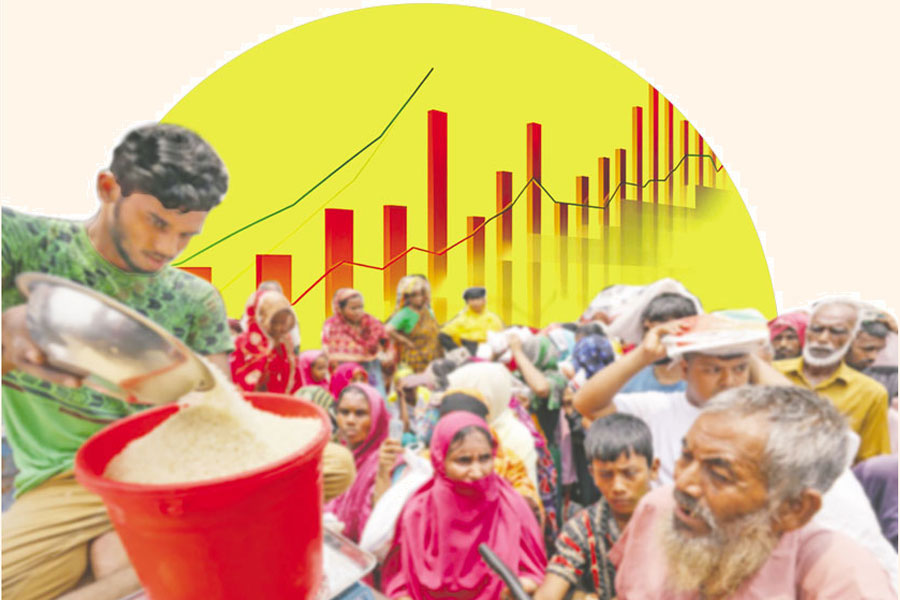
Published :
Updated :

In October, food inflation rose to 12.66 per cent from 10.44 in September 2024. According to the Bangladesh Bureau of Statistics (BBS), food inflation drove up general point-to-point inflation to 10.87 per cent in October from 9.92 per cent in September. Though these are just abstract numerical figures to experts who calculate them, to the average person, these are serious matters. For any rise in food price means less food for the family members of people in the lower income bracket. So, one is not surprised to see the queues at the locations where Trading Corporation of Bangladesh (TCB)'s food-carrying trucks sell essential commodities at subsidised prices for the low- and fixed-income people in metropolitan areas of Dhaka and Chattogram. Of late, the lines are getting longer. If the TCB's mobile trucks arrive late, the people in the queues do not leave the place, but wait braving the scorching sun or rain. Sometimes, they wait for hours. It only shows the helplessness of the low- and fixed-income people in the face of rising food prices. The programme of supplying some basic commodities at susidised prices being run by the commerce ministry covers 10 million families. But that is less than 30 per cent of the total number of households in the country. Notably, the country's poverty rate in 2023-24 stood at 6.1 per cent, according to the World Bank (WB)'s Micro Poverty Outlook. The percentage was 5.0 in FY 22. Clearly, the poverty rate, too, is increasing with the rise in food price inflation. That means, the TCB's programme can reach only a very small fraction of the poverty-stricken population in need of food support. Since there is no sign that the food price is going to decline any time soon, the government should think of providing essential commodities at a subsidized price across the country and not in one or two metropolitan areas of big cities.
Introduction of a rationing system can be one way of addressing food insecurity of the mass people. This system of supplying basic commodities to the public at subsidised prices was widespread in the past. But dishonest ration dealers were in many cases behind the failures of the system. But that should not discourage us from trying the time-tested method of reaching food stuffs at fair prices to the larger segments of the population. With the interim government declaring a war on corruption, the system should work well. So, the challenge of reintroducing the rationing system will be to hold corruption in check and, to that end, the best tool is to strictly monitor the operation of the ration dealers throughout the country.
That the high food inflation is fuelling food insecurity in the country is clear. A survey styled, 'Integrated Food Security Phase Classification (IPC)', has been conducted by international developing agencies working in Bangladesh including the United Nations. The report of the survey was made public on Saturday, November 9 last. There is reason to be alarmed by the report. It says, 23.6 million people, that is, 26 per cent of the total population, are facing acute food insecurity. Among them, 1.6 million are severely food insecure and they need urgent food aid. The areas in the city, for example, visited by food insecurity include the Old Dhaka, Mirpur and Mohammadpur. Across the country, the acutely food insecure areas are Chattogram, Rangpur, Khulna and Sylhet. Experts are of the view that the government should give the issue topmost priority. Various reforms the government has undertaken may wait. But what cannot wait is food, especially for the hungry. In this connection, the economists in the interim government who are working to tame inflation have assured that the inflation will gradually come down and so will the food price. But how can the working people whose real income has been constantly eroding with the practically unstoppable food price hike can wait indefinitely for the better days to come? That calls for prompt action from the government to ensure that the basic foods are within their reach. Coarse rice consumed by low-income people, for instance, should at least be affordable for them. But to the utter dismay of these people, this variety of rice, too, has recently become pricier by about 7.0 per cent, or in other words, by Tk2.0 per kilogram. Similarly, the type of rice the middle income people eat has experienced about 8.0 per cent price hike, which is equivalent to an increase by Tk2.0 to Tk3.0 for each kilogram within a week. But to rein in the price hike of essential commodities, no coordinated approach from the government has so far been observed. Most importantly, the policymakers at the top level should have meanwhile held meetings with the rice millers, the importers and distributors of essential commodities. Some believe that there is a trust deficit between the government and the traders. Also, traders who had links with the fallen government are not operating with the vigour they did in the past. The interim government's proactive role in handling the essential market operators through the carrot-and-stick approach can go a long way in motivating them to behave responsibly. True, the government is adopting various measures including reduction in import tariffs on some essential commodities. On the other hand, market monitoring is also ongoing. But that does not mean the traders and government leaders should not talk to sort out issues.
sfalim.ds@gmail.com


 For all latest news, follow The Financial Express Google News channel.
For all latest news, follow The Financial Express Google News channel.